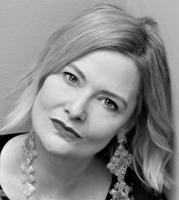One More Time with Feeling; The Use of Emotion for Training Singers
Tuesday 1st September 2020, 5:00 PM - 6:00 PM (London Time)
How does emotion affect the voice, and can it be harnessed as a tool in Western classical vocal pedagogy? Eminent voice pedagogues do use emotion as a pedagogical tool and have described their experience of its usefulness anecdotally (Bozeman, 2013 and 2017; Chapman, 2007; Williams, 2019). Scientists have striven to measure emotionally produced acoustic changes in the voice; these changes can be heard and even accurately perceived by the listener (Scherer, 1986). Muscular changes occur with emotion (Scherer, 1986) in all three components of the vocal apparatus; breathing, vocal folds and vocal tract (Sundberg, 1987), and these changes affect voice acoustics (Laver, 1980). Research shows these emotional effects on vocal acoustics to be comparable in both the speaking and singing voice (Scherer, 2015). Scherer (1986) predicted these changes in his Component Patterning Model of Vocal Affect Expression and subsequent research has largely proven his model which predicts the acoustic result of an emotion based on physiological responses.
This 1 hour webinar will outline;
- Darwin’s phylogenic theory of emotional effect and his theory of the early origins of vocalised emotion.
- Historical use of emotion and its description in the early singing treatise.
- The emotions used anecdotally by pedagogues
- The work of Professor Klaus Scherer and his early predictions of the effect of emotion on voice acoustics based on; his own emotion model of physiological response and, the work of phonetician Professor John Laver who described the acoustic change for different muscular actions of the vocal apparatus. Scherer went on to ‘prove’ his predictions with his own and other scientists research on acoustics of vocalised emotion.
- Current research on the singing voice and the effect of emotion on acoustics; how does the research compare to the emotions used by pedagogues in the studio?
- Interesting correlations with vowel use and emotion.
- Possible ways to elicit emotion in voice teaching; tips from the scientists.
- Kate will present a diagram she has compiled based on a two dimensional model of emotion with the results of the latest acoustic data, the emotions studied, as well as the emotions used anecdotally by pedagogues.
Katrina Sheppeard
Katrina Sheppeard is one of the UK’s most exciting up and coming dramatic sopranos. Since moving from Australia to London in 2008...
Sorry, this is an archived short course...
We have plenty of upcoming short courses coming soon. See details of some of them below or look at the full list of short courses.

Thursday 19th February 2026
1:00 PM - 2:30 PM
Thursday 26th February 2026
1:00 PM - 2:30 PM
(London Time)
Performing Pain: Vocal Health in Emotional Roles!

Louisa Morgan
How connected are acted emotions to our real-life emotions? Are they expressed differently? Do they feel different in the body? This 2-part course with Louisa Morgan looks at the potential impact of acted emotion on vocal health, why we should consider it as voice practitioners, and how to care for our performers needing to work with it.


Tuesday 24th February 2026
5:00 PM - 7:00 PM
(London Time)
Incorporating CBT principles within vocal health and voice care

Dr Luke Aldridge-Waddon
Join Dr Luke Waddon as he introduces the principles and techniques within cognitive-behavioural therapy (CBT) in relation to the voice and voice care. He will discuss psychological factors relevant to the development and maintenance of voice disorders and how these might be approached from a cognitive-behavioural perspective. He will describe theoretical concepts and therapeutic components often used within CBT and consider how these might be applied when working with voice users.


Tuesday 3rd March 2026
5:00 PM - 7:00 PM
(London Time)
Sex differences in VOICE!

Dr Richard Lissemore
This two-hour workshop, led by performer, articulatory phoneticist, and voice physiologist, Dr. Richard Lissemore, will examine in detail the role that biological sex plays in the perception and pedagogy of singing voices. We'll consider how parameters such as anatomy, physiology, articulation, resonance, and radiated acoustics influence the perceptions and pedagogical decision-making of singing teachers.
